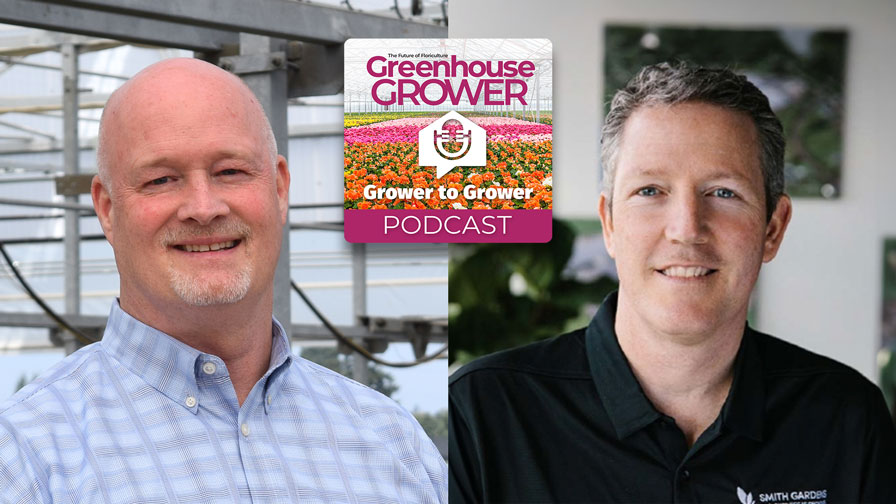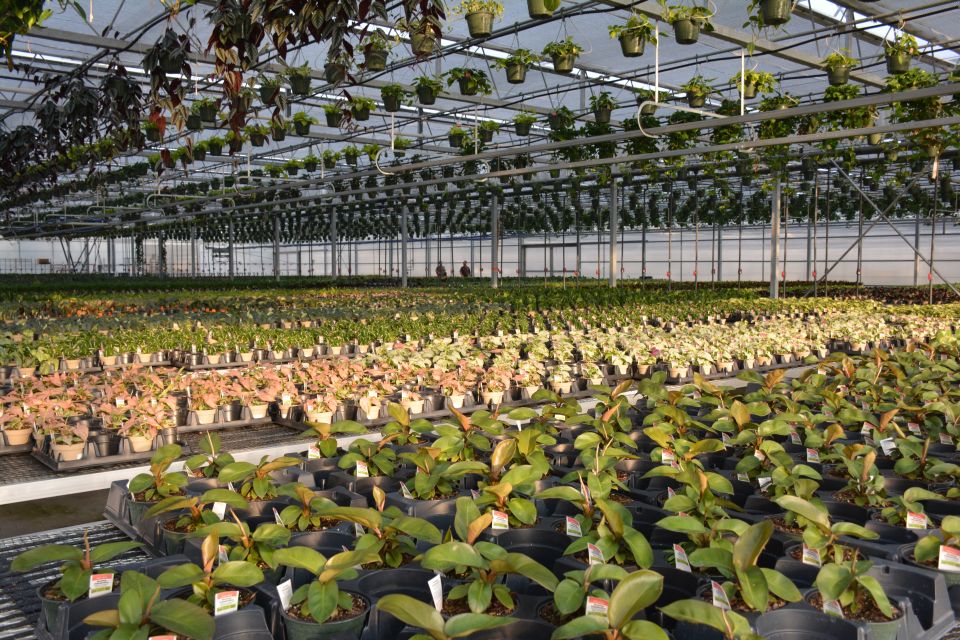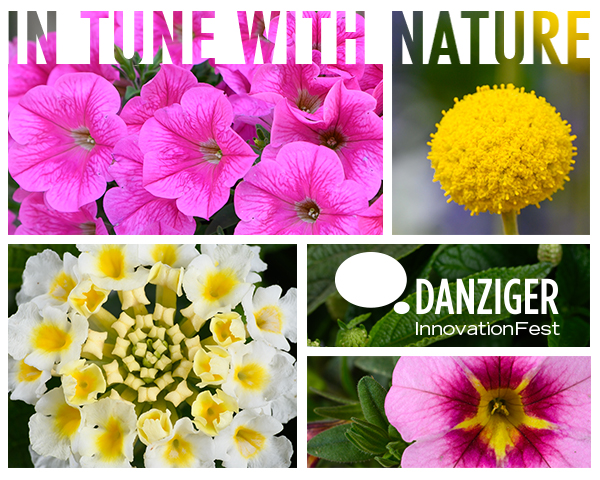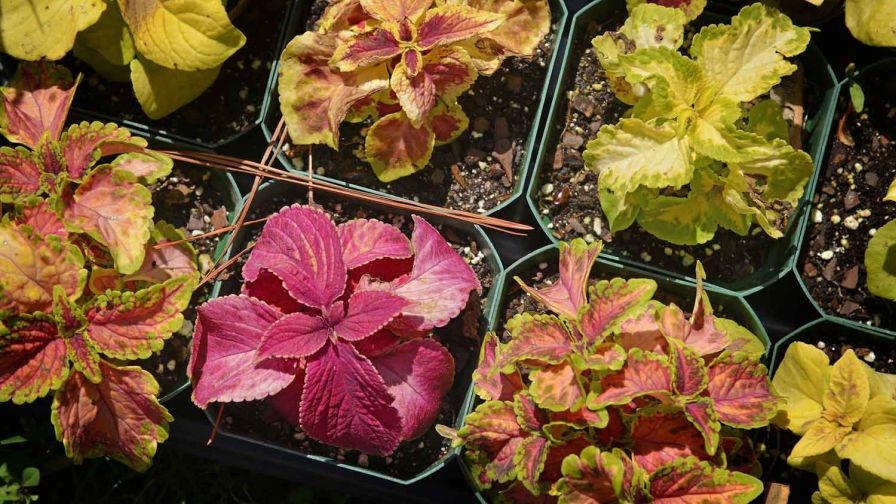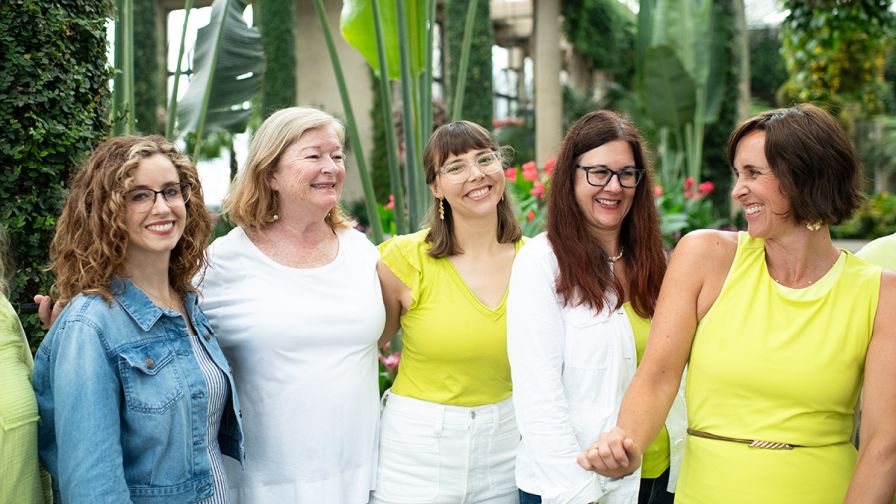Why Plantpeddler’s Industry-First Approach Is a Model for All Growers
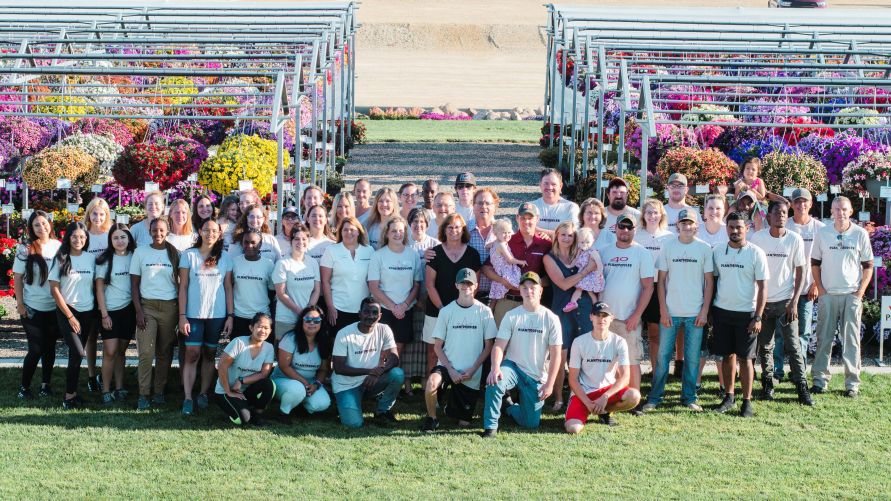
All photos: Plantpeddler
The team at Plantpeddler in Cresco, IA, is in it to win it, as the saying goes. But the winning in this case isn’t just for them; it’s for all growers, as well as consumers and the next generation.
Of course, Plantpeddler is a business first, sales driven, for-profit company. These factors drive production, growth, and expansion at the company. However, the management team led by co-owners (and leaders by example, if you will) Mike and Rachel Gooder also aim to give back. To coin another phrase, a rising tide lifts all boats, and when Plantpeddler does well, the entire industry benefits.
Plant Trials Highlight Best Performers
The plant trials at Plantpeddler come in two seasons, starting with the summer Variety Day trial and ending in winter with poinsettia trials. The goal for each is the same: to ensure Plantpeddler is producing varieties that perform best for both the grower and the end consumer.
“As part of the founding history of our company, we have always believed in trialing and testing,” Mike Gooder says. “Consumer success equals our success.”
Plantpeddler’s first summer trials took place in 2002 as the company was helping Dümmen Orange, then known as Dümmen USA, establish a presence in North America. Those trials consisted of around 200 varieties; today, that number is more than 1,500. The attendees have also grown to include breeders, growers, brokers, industry professionals, and retailers.
“Our ultimate mission is to bring together the people creating the genetics and the brokers and growers taking those genetics to market, where they can learn together about which varieties might perform best in their region,” Mike says.
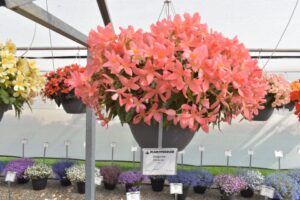
Variety trials often highlight emerging plants, such as this Begonia ‘Florencio Pink’ from Syngenta Flowers.
The other common goal for each trial is to accurately represent commercial production in a Midwest climate, where growing conditions can vary greatly by season.
“We start the summer trials in March with unrooted cuttings stuck into 3-and-a-half-inch pots, and we plant them in finished pots by the end of May and then move them into the trial garden,” says Rachel Gooder, manager of the summer trials. “We try not to give them any special treatment other than what we would normally do in the greenhouse or as a consumer could do in their home garden. You really get to see what the winners are and where the downfalls may be, which is important for other growers to know how they might perform in their own greenhouse.”
When attendees arrive, the first question they always have is what’s new and cool, according to Jason Sbiral, General Manager of Plant Production and Facilities at Plantpeddler.
“Each year, it’s always fun to see genetic evolution in action,” Sbiral says. “Once we learn how well, or how poorly, something new performs, we can then relay that information to our customers.”
Sometimes the Plantpeddler team even discovers unexpected performance, such as this past year when new dianthus selections were added to the trials.
“We all walked away realizing this is a genus that has been under-represented,” Mike Gooder says. “We were blown away by its outdoor performance, and it allowed us to introduce a new product line we were confident will perform well for both growers and consumers.”
The trials aren’t just about the plants, either. Both events focus on education, with formal seminars designed to help growers become more successful.
“It helps us take what we’ve learned here, and use it to benefit everyone else,” Sbiral says. “We’re able to provide real-world expertise.”
Emerging Plant Trends
The wave of new consumers finding the floriculture industry during the pandemic also contributed to new trends in popular crops. Here, the Plantpeddler team weighs in on some of these market shifts.
- Rachel Gooder: “We keep getting more dipledenia and mandevilla items. Growers are becoming more interested in those products because they’re easier to handle in multi-liners. Some of the cascading begonias we’ve seen are also excelling.”
- Stacy Bryant (Sales and Marketing Manager at Plantpeddler): “Some of the new series of dahlias we’ve seen are giving us a lot more confidence. They work well in flower beds, in combos, and in stand-alone pots.”
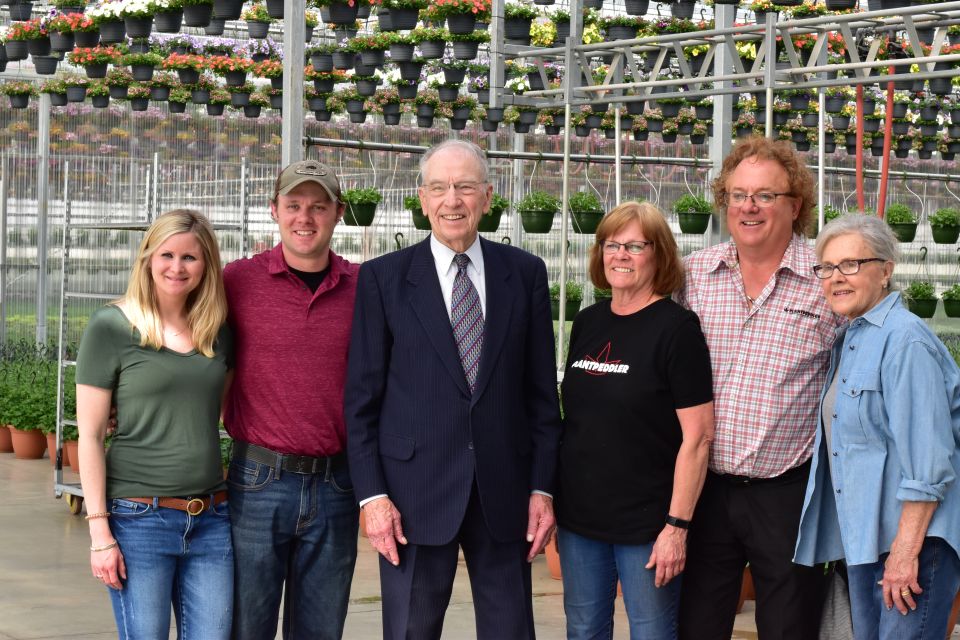
Mike Gooder’s passion for advocacy gives him a chance to host lawmakers at Plantpeddler, including U.S. Sen. Chuck Grassley.
Advocacy From the Ground Up
Plant trials are one way to support the industry from within, but Mike Gooder says it’s perhaps even more valuable and important to be an advocate for horticulture beyond the walls of the greenhouse.
“We’re not relevant as an industry unless there is an awareness of horticulture among our political leaders,” Gooder says. “The state of Iowa is driven by commodity crops, but we’ve been able to raise the awareness of what we do through our lawmakers both on a national and state level.”
Plantpeddler consistently hosts politicians, such as Iowa Governor Kim Reynolds, State Agriculture Secretary Mike Naig, U.S. Sen. Chuck Grassley, and many others.
“Not only do we show them what a technologically advanced greenhouse looks like, we highlight the revenue streams and job creation that come from what we do,” he says. “It’s important that we elevate the economic impact of our industry, as well as the fact that it’s a great work environment that people enjoy. There’s so much diversity in horticulture, yet we don’t talk about ourselves.”
This type of advocacy doesn’t have to be on such a grand scale, either. In fact, it’s easier if you start with your county supervisors and city council members.
“We want to make them aware of Plantpeddler,” Gooder says of advocacy. “It makes them more aware of what we’re about, and it makes them more aware of our industry.”
Grassroots advocacy can also mean hosting vocational education programs.
“If we can show young people some of the cool things we’re doing, it might encourage them to consider horticulture as a career path, or become engaged with plants in any form.”
Mike’s son and Plantpeddler Chief Operating Officer John Gooder speaks from experience.
“I was one of those people who would sit in a horticulture class and learn things from textbooks,” he says. “But getting first-hand knowledge in a production greenhouse can be an eye-opening experience.”
These opportunities can also help highlight the diverse range of careers available in horticulture, from shipping to marketing.
“We have a grower who joined us with a background in IT,” Mike Gooder says. “His experience works well as we add new technology to our operation.”
So how can other growers become industry advocates? Mike says working with lawmakers is not a tall mountain to climb.
“Just don’t wait until you need them to reach out,” he says. “Be proactive and invite them to your greenhouse, and invite the local press while you’re at it.”
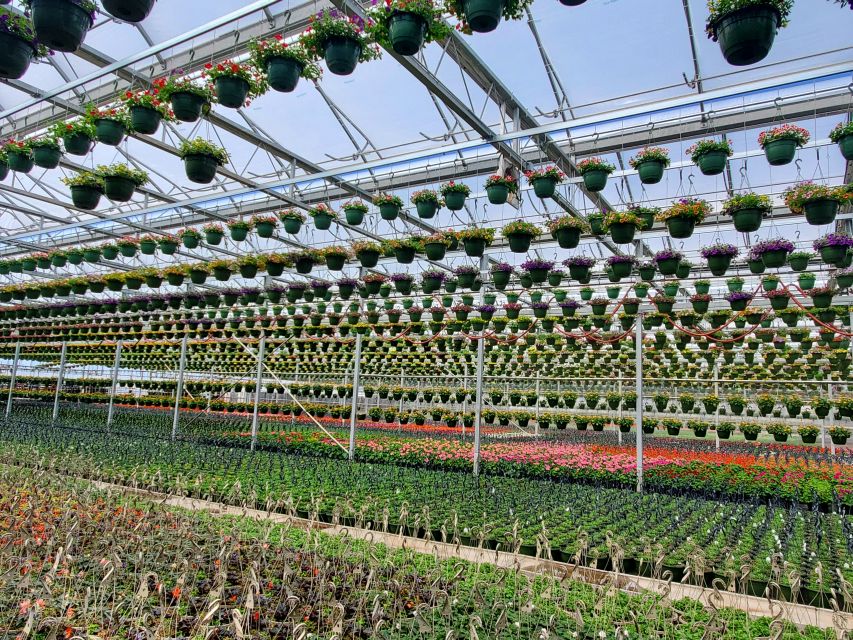
Investments in new technology help contribute to exceptional plant quality.
Technology Improves Efficiency
When it comes to adopting and implementing new technology at Plantpeddler, John Gooder says much of it is tied to helping team members become as efficient as possible. This includes updating old, stationary hanging baskets to a Metazet FormFlex movable system that is integrated with a Control Dekk Oasis watering system. It also includes adding and testing a prototype new boiler system from BioTherm, and using automatic riding sweepers to keep the greenhouse floors clean.
Aside from efficiency, Sbiral says employees also have fun using all this new technology. Why? Aside from it simply being fun, it also makes their jobs easier and allows them to see the end result of better plant uniformity.
“Systems like these have absolutely been a joy to implement in the greenhouse,” Sbiral says.
Mike Gooder says the same trial/innovation benefits of working with new varieties also applies to technology.
“It allows us to produce a better liner that at the end of the day performs better for our customers,” Mike says. “It’s a constant process of improvement and innovation, but we have to make these investments for our long-term success and leadership in the industry.
Rachel Gooder says these decisions aren’t made solely by the management team.
“Our growers and all the people that are out in the greenhouse will be the ones using this new technology or following these new procedures,” she says. “That’s why we ask them before we make the decision.”
Mike Gooder notes that the companies and people that provide everything from the genetics to the hard goods it takes to run the greenhouse are truly considered partners.
“If we help them be successful, that helps us be successful,” Mike says. “It’s paramount to our overall performance as a company that we have strong, long-term relationships.”




